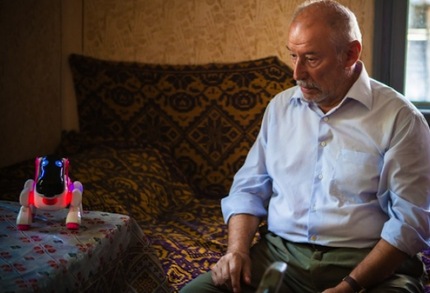Warsaw 2013 Review: Minimalist THE JAPANESE DOG Is A Feature Debut Worth Noticing

Tudor Cristian Jurgiu's debut feature stars Victor
Rebengiuc, one of the most famous Romanian actors, as Costache, an old widower
and flood victim living in one of the country's rural villages. Forced to stay
temporarily in a replacement house Costache is a conscious prisoner of a rather
insipid everyday routine that is suddenly disrupted because of some surprising
news. Namely, his son Ticu decided to come home after hearing the news of his
mother's sudden death. The old man isn't sure what to expect from that meeting
and the fact that the whole community begins gossiping about Ticu, who long
time ago abandoned a prospectless life close to home for a hope of a better
future in Japan, a country he knew nothing about, is making him more and more
anxious and angry. Though awkward at first, the encounter encourages Costache
to re-asses his beliefs, opinions and open his mind to new experiences.
The Japanese Dog is a picture that uses landscapes, sounds
of nature and single-camera setup as a mean to express its very low-key style
and composed ambiance. There's not a single shot that should be cut out,
everything seem perfectly in order and the final effect is a splendid and
visually stunning one. Right from the first scene the director announces that
the events which are about to take place won't be filled with action, and
that's a statement that makes the picture seem real, condensed, raw and thus
more emotionally engaging. Costache is fully aware of his position and though
he finds the idea of having a Japanese daughter-in-low and grandson hard to
swallow at first, his attitude towards the two changes immediately after he sees
them.
It's always interesting to observe how different cultures
communicate on a daily basis and I honestly think that The Japanese Dog shows
that kind of communication in a truly authentic manner. Even though the wife
and the child understand and speak Romanian there's still a visible distance
between them and Costache and no matter how hard they try to break the cross-cultural
wall it still remains to be seen somewhere between the characters.
Throughout those few days spent with his family the
protagonist gets a new reason to enjoy his life and Rebengiuc uses his acting
skills perfectly in order to depict the old man's newfound satisfaction mixed
with disappointment when he realizes that the gleeful days will end soon. He
tries to convince his son to live with him again in a year or two and when he
turns down that proposition Costache gets angry and boozes up. That scene of
him drinking with his friend and re-telling a fight that he got into some time
ago is a climax of sorts, the character's mild outburst and his only moment of
weakness, yet a short one. When his son and the family leave, Costache reborn
with a new passion for living decides to go on a trip of his own in an ending
that cleverly leaves room for interpretation.

Do you feel this content is inappropriate or infringes upon your rights? Click here to report it, or see our DMCA policy.






